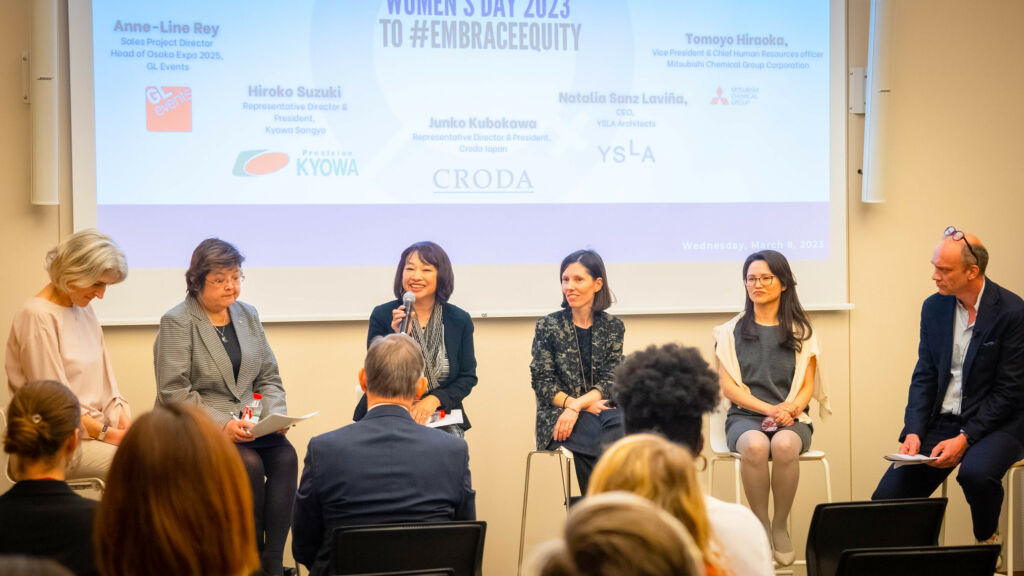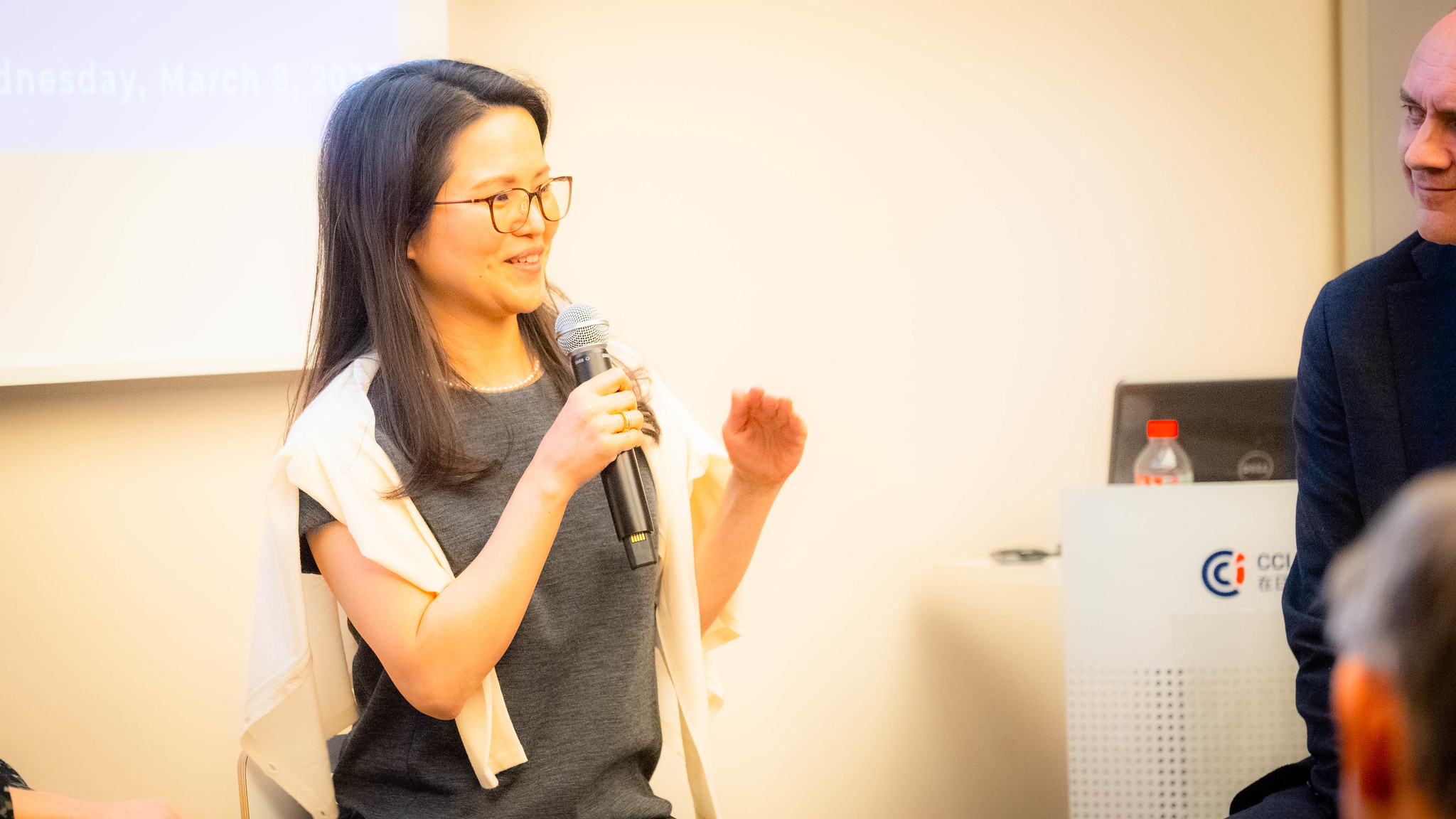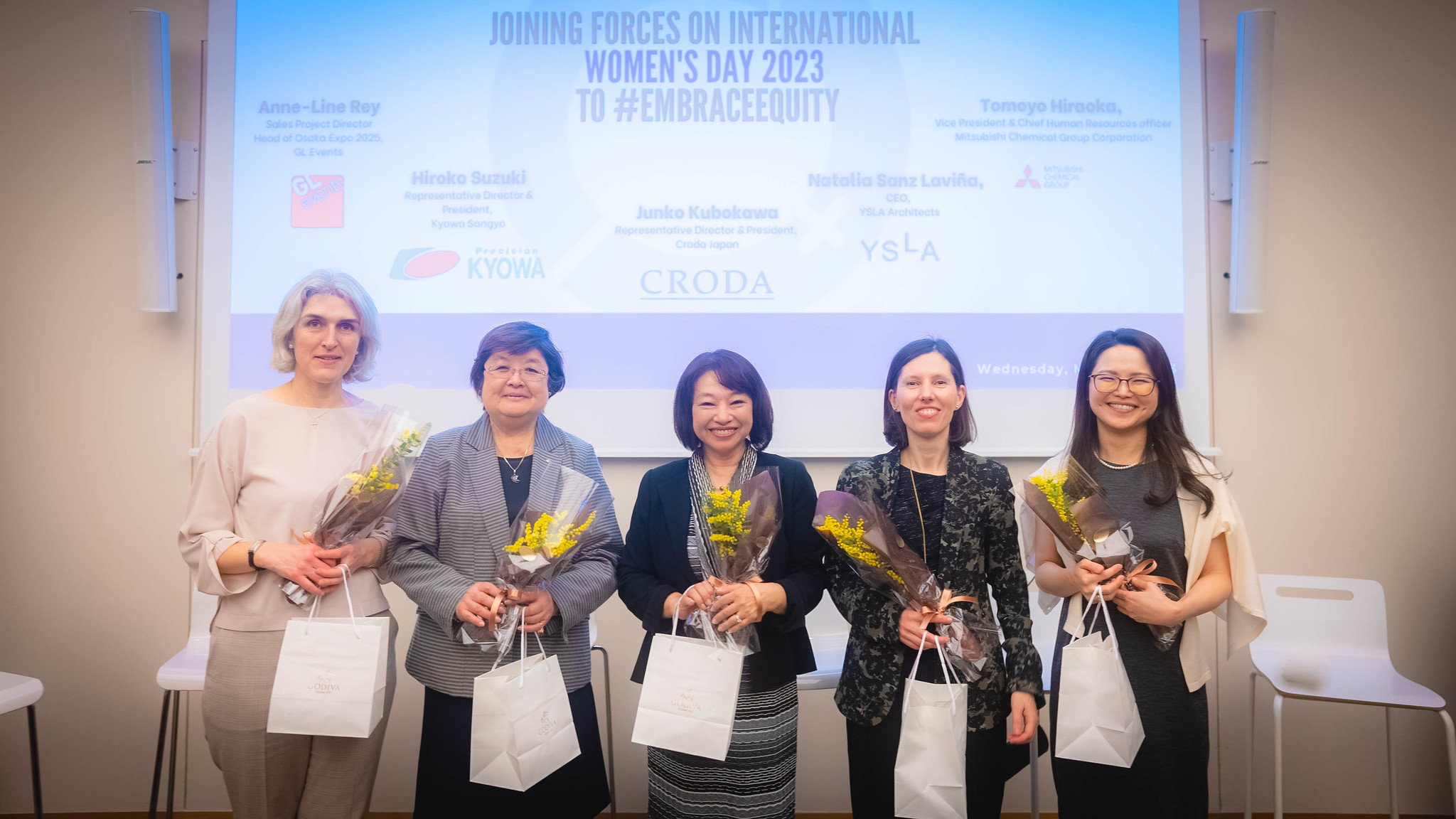Member? Please login
Embracing equity: Japan’s slow path to female advancement

Written by Sanae Samata
March 17, 2023
Diversity & Inclusion, Past Event Round Ups
#EmbraceEquity was the theme of International Women’s Day 2023 (IWD 2023), but the latest international survey has delivered some grim reading for female economic advancement in Japan.
Japan’s slow progress towards gender equality was highlighted by a March 2023 World Bank report, which found the nation ranked a lowly 104th among 190 countries and territories, the lowest of the 38 OECD members. Among the OECD’s 34 high-income economies, Japan was the only one lacking laws on sexual harassment in the workplace, while lagging in employee pay, the survey found.
Japan’s international ranking has declined in recent years, sliding from 74th in the World Bank’s 2020 report to 80th in 2021 and 103rd in 2022.
In 2020, 9.9% of seats in the Diet were held by women, and the female share of senior and middle management was 14.7%, according to the report. This is despite previous targets by the Japanese government, such as increasing the number of women occupying “leading positions” to 30% by 2020.
In a bid to address these differences and achieve positive change, the BCCJ joined with the Belgian–Luxembourg, French and Spanish chambers of commerce in Japan to host an #EmbraceEquity event, held on IWD 2023 in Tokyo.
Addressing the issue of workplace equality was a distinguished panel of female speakers, comprising Croda Japan President Junko Kubokawa; YSLA Architects CEO Natalia Sanz Lavina; Kyowa Industrial President and CEO Hiroko Suzuki; Sales Project Director / Head of Osaka Expo 25 at GL Events Japan Anne-Line Rey; and Mitsubishi Chemical’s Chief HR Officer, Tomoyo Hiraoka.
Equity and equality
Croda’s Kubokawa kicked off the event by explaining equity in terms of women’s empowerment. It can be considered the practice of implementing strategies and measures to compensate for women’s historical and social disadvantages. In short, equity can lead to equality.
Kubokawa said organisations need to strike the right balance between flexibility and being “fair” to other employees.
“We try to be as flexible as possible … we want people to be in the office 60% of the time … but when you go too far [with flexibility] with only certain individuals, where’s the fairness for those complying with the company rules? We want people to have opportunities … But there is no black and white,” she said.
GL Events’ Rey said the world is “far from embracing [gender] equity,” in part because of the challenges in understanding the concept and how it is not encouraging inequality, but also because people find it hard “explaining what they need to thrive.”
Mitsubishi Chemical’s Hiraoka said female staff don’t want special treatment and stressed the importance of overcoming “unconscious bias” in decision-making, such as assuming that a mother with young children would not like a global role requiring early morning or late-night conference calls.
Kyowa Industrial’s Suzuki said she has provided opportunities for women, including some in the Philippines and India, to be trained in-house if they are interested in manufacturing, as the company is “constantly short of workers.”
Hiraoka said her company had ended tanshin funin, the traditional Japanese practice of dispatching male staff to locations away from their families for extended periods.
“Employees can turn down the opportunity [for transfer] without any issue,” she said, adding that younger male employees show less interest in solitary transfers as they feel a “strong responsibility to support their spouse and children” compared to older male workers.

Challenging stereotypes
Suzuki admitted she had experienced work challenges, including one occasion when she pitched to a Japanese male CEO of a big company.
“I did all my networking and finally called … I started explaining my name and our company and he just hung up. I was kind of shocked. But I think he hadn’t experienced [dealing with] a female president before,” she said. “After that I let a manager call him and finally got to talk to him. There was a culture … although I don’t think this will happen in the future.”
Similarly, Lavina said she is typically the only female on construction sites, which in Japan are typically staffed by men who have never been led by women. “I have to be sensitive of that,” she said, adding that usually they are very kind and the atmosphere “may be softer” when she is present.
Rey added that, in Japan, senior titles are respected, regardless of gender: “It’s hard to get into a position, but once you’re there, people won’t doubt you or that you can do the job. I haven’t always had the same experience with my foreign counterparts,” she said.
Lavina said gender stereotypes need to be challenged not only in the workplace but in other social settings, including education, to foster a different mindset.
“We can’t expect change if basic education isn’t changing,” she said. “I saw a leaflet about kids being welcomed home from school by their mothers at 3pm; this needs to change.”
Driving change
Asked about the World Bank report, Hiraoka said change would require concrete measures, such as requiring a proportion of female executives or implementing specific key performance indicators (KPIs) on female advancement.
Kubokawa said “authentic leadership” is needed “to translate ideas into something meaningful and inclusive for the organisation. What gets measured gets done; it’s important to set numerical targets and KPI’s and explain why the KPI is there.”
Can Japan rise up the international equality rankings and achieve the vision of Womenomics as espoused by former Prime Minister Shinzo Abe?
With Japan’s birth rate continuing to decline, and amid estimates by Goldman Sachs that closing the gender gap could boost Japan’s gross domestic product by nearly 13%, there are reasons aplenty why Japan needs to #EmbraceEquity.








